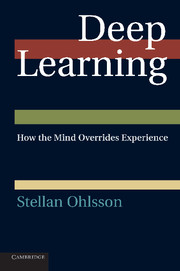12 - The Recursion Curse
Published online by Cambridge University Press: 25 January 2011
Summary
… all inferences from experience suppose, as their foundation, that the future will resemble the past.… It is impossible, therefore that any arguments from experience can prove this resemblance of the past to the future, since all such arguments are founded on the supposition of that resemblance.
David Hume… predictions based on some regularities are valid while predictions based on other regularities are not.… To say that valid predictions are those based on past regularities, without being able to say which regularities, is thus quite pointless.
Nelson GoodmanIf the deep learning thesis is at least approximately correct, our cognitive processes not only endow us with cognitive mechanisms for learning new knowledge and skills but also allow us to override what we have learned. The three micro-theories of creativity, adaptation and conversion describe cognitive mechanisms that accomplish this. It would be foolish to claim that the micro-theories are exactly accurate. Further research will no doubt force revisions. However, there is no reason to expect the fundamental principle that knowledge is, and must be, defeasible to be contradicted by future research. This feature of cognition is grounded in the ceaseless turbulence of the material and social worlds and in our evolutionary strategy of relying more on acquired skills than on innate behaviors.
The consequence is that we sometimes succeed by projecting the past onto the current situation, but at other times we do better if we override prior experience and generate a novel response to the situation at hand.
Information
- Type
- Chapter
- Information
- Deep LearningHow the Mind Overrides Experience, pp. 389 - 392Publisher: Cambridge University PressPrint publication year: 2011
